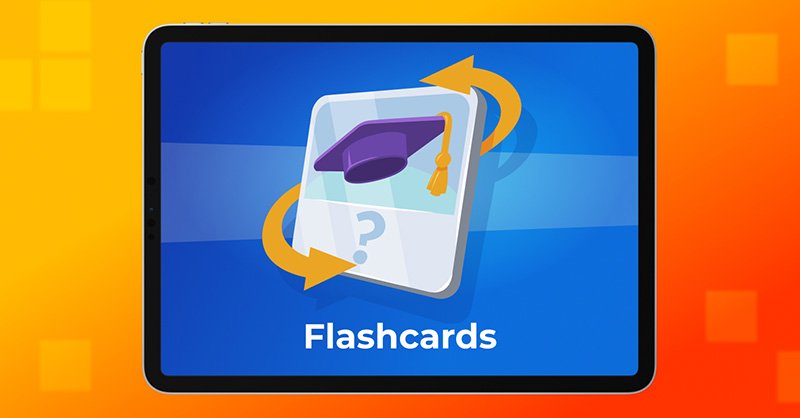Accelerate Academic Success with Flashcards
Flashcards are a versatile and powerful study tool that can help you achieve better grades in less time. Their ability to enhance memory through active recall and spaced repetition makes them ideal for mastering even the most challenging subjects. Whether you’re preparing for an exam, learning a new language, or exploring a complex topic, flashcards offer a focused and efficient approach to studying.
Why Flashcards Work So Well
The secret behind flashcards’ effectiveness lies in active recall and spaced repetition. Active recall forces your brain to retrieve information from memory, strengthening neural pathways and making it easier to remember. Spaced repetition builds on this by timing reviews to occur just before you forget the material, reinforcing long-term retention. Together, these techniques create a learning experience that’s both efficient and impactful.
How to Create Flashcards That Work
Effective flashcards don’t just happen—they require thoughtful design. Follow these tips to ensure your flashcards maximize your learning potential:
- Focus on One Concept per Card: Avoid overcrowding your cards with too much information.
- Use Clear and Concise Language: Stick to simple, easy-to-understand wording.
- Add Visual Elements: Incorporate diagrams, symbols, or color coding to engage visual learners.
- Ask Questions: Frame your content as questions to encourage active recall.
- Provide Context: Include examples or scenarios to make the material relatable and easier to understand.
Using Flashcards for Maximum Efficiency
Designing good flashcards is only part of the equation. To get the most out of them, use these strategies:
- Set a Study Schedule: Regular reviews are key to embedding knowledge into long-term memory.
- Shuffle Often: Prevent memorizing the order by regularly mixing up your deck.
- Quiz in Both Directions: Test yourself from question to answer and answer to question for full comprehension.
- Limit Study Sessions: Short, focused study periods are more productive than long, exhaustive ones.
Preparing for Big Exams: How Long to Study for the MCAT?
The MCAT is one of the most demanding exams, requiring months of preparation. Many students wonder how long to study for the MCAT, and the answer depends on factors like starting knowledge and study schedule. Flashcards are an invaluable tool for breaking down massive amounts of information into digestible pieces. Use them to master key concepts, formulas, and pathways, and pair them with timed practice tests to gauge progress and improve test-taking strategies.
Avoid Common Flashcard Mistakes
Even though flashcards are simple, certain pitfalls can limit their effectiveness. Here’s what to avoid:
- Cramming Too Much on a Card: Keep information concise to make it easier to review.
- Skipping Difficult Cards: Spend more time on challenging topics rather than avoiding them.
- Passive Reviewing: Actively engage with the material instead of just reading through the cards.
- Inconsistent Practice: Stick to a regular schedule to reinforce learning.
Advanced Flashcard Techniques
Once you’ve mastered the basics, elevate your studying with these advanced methods:
- The Leitner System: Organize cards into levels based on how well you know them. Review lower-level cards more often to strengthen weaker areas.
- Gamify Your Studies: Use apps or set rewards for milestones to make learning fun and engaging.
- Incorporate Mnemonics: Pair complex concepts with rhymes, acronyms, or visual imagery to make them easier to remember.
- Collaborate with Others: Share decks with classmates or study groups to gain new insights.
Tracking Your Progress
Measuring your progress keeps you motivated and ensures you’re on the right track:
- Set Goals: Break your learning into achievable milestones, such as mastering 50 cards per week.
- Use Digital Tools: Apps like Anki offer analytics that show retention rates and highlight areas needing improvement.
- Reflect and Adjust: Regularly assess what’s working and adapt your strategies accordingly.
Integrating Flashcards into Your Routine
Flashcards are highly adaptable and can be used in various learning scenarios:
- For Languages: Memorize vocabulary, grammar rules, and pronunciation tips.
- For STEM Subjects: Break down equations, formulas, and theories into manageable parts.
- For Exam Prep: Organize topics into flashcard sets for focused study sessions.
Conclusion
Flashcards are one of the most efficient tools for boosting your grades and mastering challenging subjects. By combining thoughtful design, active recall, and spaced repetition, you can optimize your learning experience and achieve your academic goals faster. Whether preparing for the MCAT or improving in other areas, flashcards provide a versatile and effective approach to studying. Start integrating them into your routine today, and experience the difference for yourself!
